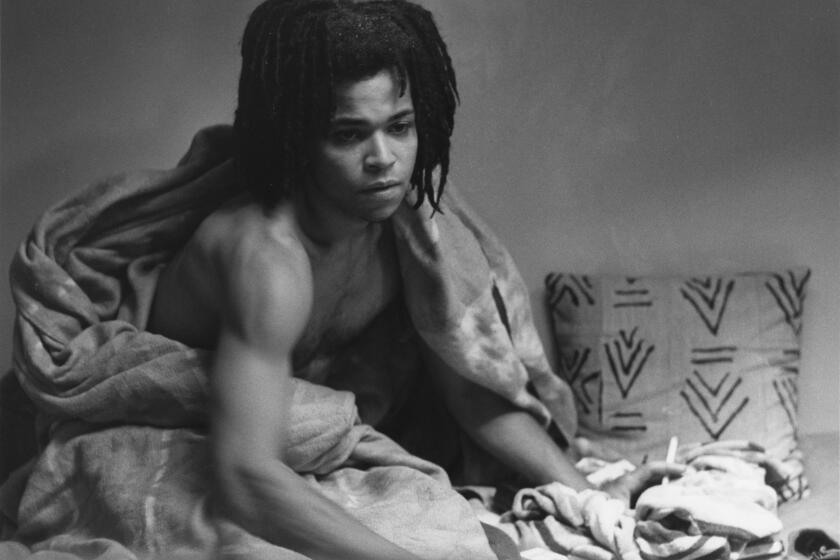THAT FATAL MOVIE WORD
Did you know there are half a dozen words guaranteed to kill the public’s interest in a movie? We’re not talking “Purest gossamer,” or “Not for children only,” or “A film for the ages.” Anyone knows better than that. No, these words are staples in the larder of most of us who write about films, but they’re killers. Or so I’ve just learned.
“Small.” “Heartwarming.” “Inspiring.” “Deeply moving.” “Meticulous” (as in meticulously made). And the final one-two punch: “Poetic” and--the word so bad you must go outside the dressing room, spit three times and pay all your back debts before you are allowed in again--”Documentary.”
If it hadn’t been for a fit of weakness on the part of a good friend, who also happens to be a good publicist, I suppose I might never have known about this, but she was culling for her ads and I became interested and it just came out. Want to kill a film? Tell people it’s a documentary.
Well! I was outraged. “But some of the best. . . .”
“ I know that,” she said patiently. “ You know it. You just don’t say it. You can call it ‘truthful’ or ‘the gripping story of. . . .’ ” or, she had the grace to blush, “ ‘borrowed from life.’ ”
How did a good film form sink this low? She had a few theories. If you play free association around the words “documentary film” with the average moviegoer, what do you get? “Eraser Dust.” “P.S. 123.” “The Miracle of Birth.”
“I dunno, I always slept through them.”
School was the root of the trouble. And since the experience of school is relatively widespread, so was a widespread hunch that documentary film was (a) good for you and (b) something you wouldn’t touch with a forked stick.
When these school kids grew up, documentaries--in theaters--only confused them. (On television it was a little better. Nobody hated Jacques Cousteau.) You go to a movie, you know what that movie is going to be. A Western is a Western. Neil Simon is Neil Simon. “Friday the 13th” is not “Gandhi.” But go to a documentary and you might encounter anything from “The Man Who Skied Down Everest” to how strippers put on their pasties. Unsettling.
I can’t say that you’re going to get the answer to this wretched business from these quarters. All I will say is that of the five best films I’ve seen so far this year, one is nearly 16 hours long, and the other four are documentaries.
Two are here now, one is to come shortly and I know of no plans at present to distribute the fourth. That one, “28-Up,” was at Filmex; you may have read about it before. Its plan was beautifully simple: To ferret out whether the class system had really died in 1960s “liberated” England, a cross-section of schoolchildren from exceedingly different backgrounds were chosen. They were interviewed at seven-year intervals, from the age of 7 until they were 28. The project, done by the left-leaning Granada television people, was largely the work of Michael Apted; the results were enthralling.
How it all comes out--that’s the one constant in every great piece of storytelling. And here, before our eyes, were the answers, not necessarily chronologically but cut back and forth so that you moved from the child to the adult and back again. The only thing more fascinating is the life immediately around us and that seems to be moving slowly. “28-Up” proved its makers’ own melancholy point, of course, it hardly expected not to. But it was also film making as gripping as a Dickens novel (and as socially relevant.)
“Streetwise,” by Martin Bell, Mary Ellen Mark and Cheryl McCall, another film with resounding social repercussions, will be here in May. With the deepest compassion it follows a group of young Seattle street children--into hell and not necessarily back out again.
I know that simply assembling “The Times of Harvey Milk,” this year’s Academy Award winner, by Robert Epstein and Richard Schmiechen, was a triumph in itself, but that isn’t what moves me about it. It’s the tone of the film, somehow free from the deep anger it might understandably contain. That a film about the loss of an irreplaceable man in a despicable manner can manage to be a message of strength and reassurance is extraordinary.
And finally “George Stevens: A Filmmaker’s Journey,” which may just be a great film and is certainly a great tribute from a son, George Stevens Jr., to his father. The film leaves one full of emotion; it is as much a model of what the best documentary can be as Stevens’ life is a model of what a humane, intelligent film maker--born with a healthy jolt of stubbornness--can be.
Its Academy screening was a profoundly emotional night with almost everyone of the film’s interviewees there in the audience, in addition to a beaming George Stevens Jr. When we met, among other things, we talked about the film’s opening in Los Angeles two days later, as well as the strong group of American documentary films that have just surfaced. He winced, very very slightly. “We don’t want people to think of this as a documentary,” he said.
Perhaps the trouble about d-c-m-nt-r--s isn’t only with their audiences.
More to Read
Only good movies
Get the Indie Focus newsletter, Mark Olsen's weekly guide to the world of cinema.
You may occasionally receive promotional content from the Los Angeles Times.










